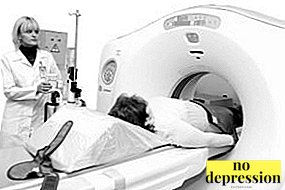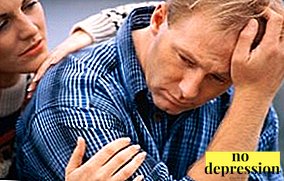Carcinophobia is pathological fear of cancer.
This phobia is considered one of the most common in the world and can seriously deteriorate the quality of life.
Man having her regularly suspects in his the presence of malignant tumors, too often undergoes examinations and examines materials related to cancer.
General information

What is carcinophobia? Oncological diseases Often detected late, which leads to the death of the patient.
Most often, fatal diseases of the cardiovascular system end, but they are followed by oncological diseases that kill millions of people every year.
Die from them even rich, famous people: Steve Jobs, Alan Rickman, Edith Piaf, Walt Disney. Therefore, the topic of oncological diseases is widely covered in the press, including online publications, becoming the topic of lengthy discussions and research.
Any interested person can go online and find there a lot of frightening information: contradictory symptoms, difficulty in diagnosing at the early stages, frightening pictures of tumors at the stage of disintegration, ominous words "palliative medicine", "opioid analgesics".
Imagination paints picturesque painful dying, and there is carcinophobia.
This phobia is often observed in people with other mental disorders, such as panic disorder, obsessive-compulsive syndrome, generalized anxiety disorder, hypochondria, psychasthenia, schizophrenia.
What else is the fear of getting sick with an incurable disease? Carcinophobia has other names: carcino phobia, oncophobia.
Why cancer occurs and how to protect yourself from the disease? Find out from the video:
Causes of fear
The main factors contributing to the development of cancer phobia are:
 Care and supervision of a person who has cancer, especially at the stage at which the chances of recovery are zero. A person watching the suffering of a close relative or friend feels helpless, and the negative experience of dear people in the treatment of malignant tumors reinforces the idea of the fatality of cancer, especially in cases when a developed oncology is detected against the background of almost complete health of a loved one.
Care and supervision of a person who has cancer, especially at the stage at which the chances of recovery are zero. A person watching the suffering of a close relative or friend feels helpless, and the negative experience of dear people in the treatment of malignant tumors reinforces the idea of the fatality of cancer, especially in cases when a developed oncology is detected against the background of almost complete health of a loved one.- Own experience of treatment for cancer. The process of cancer treatment is difficult, and therapeutic methods can take away all the forces. Acceptance of anticancer, corticosteroid drugs and radiation therapy undermines the immune system and adversely affect the body as a whole, so a person often suffers from infectious diseases, feels exhausted, unable to perform even simple things, and the fear that therapy will fail, worries many cancer patients. And when a person hears the word "remission" from his doctor, most of all he does not want the disease to recur. Therefore, among cancer patients in remission, cancer phobia is widespread.
- Personality features. Increased suggestibility makes a person vulnerable to information about malignant neoplasms; therefore, articles, medical TV shows, and feature films depicting a person dying from cancer, stories of friends, and comments on forums can provoke cancer phobia.
 Mental illness. People with anxiety disorders, OCD, depression, neurosis, schizophrenia often develop carcinophobia, which further aggravates the course of the underlying disease, complicates the treatment process and deprives a person of hope of recovery.
Mental illness. People with anxiety disorders, OCD, depression, neurosis, schizophrenia often develop carcinophobia, which further aggravates the course of the underlying disease, complicates the treatment process and deprives a person of hope of recovery.- Psycho-emotional turmoil. People who have recently experienced something bad (the death of loved ones, pets, severe episodes of physical or sexual violence, separation from their loved one, loss of work) are vulnerable. They often develop phobic disorders and many other mental disorders.
People who have undergone surgery to remove benign neoplasms may also begin to experience fear associated with cancer.
A psychologist about where cancer phobia comes from and how it manifests itself in this video:
Development mechanisms
According to cognitive-behavioral psychotherapy, the development of any phobia is based on two processes:
 Cognitive schemes. They are created in the minds of people on the basis of the experience gained, including the negative one, which is associated with cancer. The cognitive scheme is fixed, and a person develops cancerophobia. Chains of irrational judgments arise in his head, which are broken down in the process of psychotherapeutic treatment and replaced by new ones. Due to the presence of specific cognitive patterns, automatic thoughts associated with fear, which cause new panic attacks, appear regularly in a person’s head.
Cognitive schemes. They are created in the minds of people on the basis of the experience gained, including the negative one, which is associated with cancer. The cognitive scheme is fixed, and a person develops cancerophobia. Chains of irrational judgments arise in his head, which are broken down in the process of psychotherapeutic treatment and replaced by new ones. Due to the presence of specific cognitive patterns, automatic thoughts associated with fear, which cause new panic attacks, appear regularly in a person’s head.- The reaction of the human body to what is happening. This item includes all behavioral features associated with fear and triggered by cognitive patterns: breathing, posture, and more.
So that a person can get rid of fear, the psychotherapist demonstrates to him how his phobia works, and helps him to understand that the statements causing panic are irrational.
Symptoms and signs
Features of phobic manifestations depend on many factors: a person’s age, his personal characteristics, the amount of time during which he had carcinophobia, the presence or absence of other psychological disorders.
Main symptoms cancer phobia (in each case, the number and severity of symptoms are individual):
- Character Changes: tearfulness, emotional instability, regular health complaints, aggressiveness, irritability, isolation, constant affecting oncological diseases in the conversation, frequent agitation.
 If you try to explain to a person with cancer phobia that his fears are irrational, you are more likely to get pronounced opposition. A person may be offended, try to stop the conversation. But even if the logical arguments reached the goal, after a while fear reappears.
If you try to explain to a person with cancer phobia that his fears are irrational, you are more likely to get pronounced opposition. A person may be offended, try to stop the conversation. But even if the logical arguments reached the goal, after a while fear reappears. - Increased, partly pathological interest in the topic of oncological diseases, attempts to independently treat cancer. A man fanatically studies everything related to the topic of cancer, watches popular science broadcasts, reads books, articles, and many people fall for scammers who provide false information about the disease and methods of its treatment. They can begin to be treated for non-existent cancer, using the most dubious methods, if you can call them that: treatment with soda, kerosene, vodka, amanitas, urine, prolonged fasting, taking untested and expensive dietary supplements, eating beetles. Often this inadequacy is combined with pronounced distrust of traditional medicine.
- Regular examinations to identify a malignant tumor. Carcinophobes, when they come to the hospital, make a lot of complaints to the attending physician and can immediately appropriate a certain kind of cancer to themselves. Attempts to persuade them do not always end in success: it all depends on the responsibility of a single cancerophobe. Usually, all studies do not show the presence of cancer, which does not soothe carcinophobes, and in a few weeks they come to undergo new examinations.
 Avoiding any examinations for fear that cancer will eventually come to light. The opposite extreme, which is associated with a person's conviction that if cancer really exists, it is better to remain in ignorance than to learn and live in fear, waiting for death. Even if they have other diseases that require monitoring and observation, they still avoid visiting medical institutions, which adversely affects their somatic health.
Avoiding any examinations for fear that cancer will eventually come to light. The opposite extreme, which is associated with a person's conviction that if cancer really exists, it is better to remain in ignorance than to learn and live in fear, waiting for death. Even if they have other diseases that require monitoring and observation, they still avoid visiting medical institutions, which adversely affects their somatic health.- Vegetative symptoms. When a person encounters information about cancer, discovers signs of a malignant neoplasm, he is experiencing not only panic fear. Phobias are almost always accompanied by autonomic symptoms: increased heart rate, sensation of heat or cold, jumps in blood pressure, tremors, increased sweating, rapid breathing, feeling that there is not enough air, dizziness, nausea.
- Changes that occur over time in the identity of many cancerophobes. They withdraw into themselves, refuse to communicate closely with loved ones, their mental abilities deteriorate, especially memory and thinking, their interest in career growth and maintaining social contacts disappears, and the symptoms observed earlier become more pronounced.
But, of course, these are extremes observed in a small percentage of cancerophobes, usually in the elderly with encephalopathic changes in the brain.
Hypochondriacs have various phobias associated with diseases that are much more difficult than those who do not have this mental disorder.
Hypochondriac carcinophobia they become unbearable, they constantly say that they have cancer, they use emotional blackmail if their wishes are not fulfilled (“I’ll die because of a tumor, and you will bite your elbows, but will be too late!”) their well-being, measure the temperature, pressure.
Have hypochondriacs having schizophrenia, cancer phobia can appear in delusional reasoning. Any, even random, information can further convince the hypochondria that he has an incurable disease.
You can learn about hypochondria from the video:
Treatment

I'm afraid of getting cancer: what to do? Clinical psychologists and psychotherapists, who select the most optimal treatment regimen for each patient.
It usually includes psychotherapeutic and pharmacological therapies.
Groups of drugs used to treat cancer phobia:
- benzodiazepine tranquilizers. They block anxiety, improve sleep, but can cause chemical dependence, and one of the common side effects from taking it is inhibition. Examples: Diazepam, Gidazepam;
- antidepressants. Also positively affect the patient's mental state, increase mood, improve sleep and appetite, reduce anxiety. Examples: Prozac, Zoloft;
- beta blockers. Block adrenaline receptors, therefore, are able to quickly remove the autonomic symptoms. Examples: Anaprilin, metoprolol.
But drug therapy without psychotherapy is useless, and with drug withdrawal, symptoms quickly return.
In the treatment of cancer phobia, cognitive therapy methods are often used, in which a person learns how to rationally treat his fears and see their groundlessness.
Psychotherapist gives the patient assignmentsFor example, maintaining a table for recording automatic thoughts associated with fear. They are entered into the first column, and the second is recorded logically based counterarguments.
Also in the fight against phobias are used and other types of psychotherapy: methods based on psychoanalysis and aimed at identifying the root causes of phobias, gestalt therapy, existential psychotherapy.

On their own It is difficult to fight cancer phobia, but it is possible, however, attempts at self-control against a chronic phobia that has lived with a person for years, decades, are ineffective.
One of the most common methods for independent work with a phobia is based on the creation of links between pleasant emotions and fear.
Man need recall the brightest, warmest memories from your life and attach them to a simple action (stroking the wrist, earlobe), which can be repeated when fear arises:
- Feel all the emotions associated with the memory, allow it to fill your head and give a feeling of relaxing lightness in the body;
- after that, when it becomes clear that positive emotions have reached a peak, a trigger action should be performed within a few seconds;
- In order for the connection to be fixed, it is necessary to repeat the process of immersion in emotions and the action-trigger several times.
If after a few weeks of practice, the fear still does not let go, you should contact a psychotherapist. The sooner the therapy begins, the higher the likelihood that the fear will completely disappear.
How to overcome the fear of cancer - advice of a psychologist:

 Care and supervision of a person who has cancer, especially at the stage at which the chances of recovery are zero. A person watching the suffering of a close relative or friend feels helpless, and the negative experience of dear people in the treatment of malignant tumors reinforces the idea of the fatality of cancer, especially in cases when a developed oncology is detected against the background of almost complete health of a loved one.
Care and supervision of a person who has cancer, especially at the stage at which the chances of recovery are zero. A person watching the suffering of a close relative or friend feels helpless, and the negative experience of dear people in the treatment of malignant tumors reinforces the idea of the fatality of cancer, especially in cases when a developed oncology is detected against the background of almost complete health of a loved one. Mental illness. People with anxiety disorders, OCD, depression, neurosis, schizophrenia often develop carcinophobia, which further aggravates the course of the underlying disease, complicates the treatment process and deprives a person of hope of recovery.
Mental illness. People with anxiety disorders, OCD, depression, neurosis, schizophrenia often develop carcinophobia, which further aggravates the course of the underlying disease, complicates the treatment process and deprives a person of hope of recovery. Cognitive schemes. They are created in the minds of people on the basis of the experience gained, including the negative one, which is associated with cancer. The cognitive scheme is fixed, and a person develops cancerophobia. Chains of irrational judgments arise in his head, which are broken down in the process of psychotherapeutic treatment and replaced by new ones. Due to the presence of specific cognitive patterns, automatic thoughts associated with fear, which cause new panic attacks, appear regularly in a person’s head.
Cognitive schemes. They are created in the minds of people on the basis of the experience gained, including the negative one, which is associated with cancer. The cognitive scheme is fixed, and a person develops cancerophobia. Chains of irrational judgments arise in his head, which are broken down in the process of psychotherapeutic treatment and replaced by new ones. Due to the presence of specific cognitive patterns, automatic thoughts associated with fear, which cause new panic attacks, appear regularly in a person’s head. If you try to explain to a person with cancer phobia that his fears are irrational, you are more likely to get pronounced opposition. A person may be offended, try to stop the conversation. But even if the logical arguments reached the goal, after a while fear reappears.
If you try to explain to a person with cancer phobia that his fears are irrational, you are more likely to get pronounced opposition. A person may be offended, try to stop the conversation. But even if the logical arguments reached the goal, after a while fear reappears. Avoiding any examinations for fear that cancer will eventually come to light. The opposite extreme, which is associated with a person's conviction that if cancer really exists, it is better to remain in ignorance than to learn and live in fear, waiting for death. Even if they have other diseases that require monitoring and observation, they still avoid visiting medical institutions, which adversely affects their somatic health.
Avoiding any examinations for fear that cancer will eventually come to light. The opposite extreme, which is associated with a person's conviction that if cancer really exists, it is better to remain in ignorance than to learn and live in fear, waiting for death. Even if they have other diseases that require monitoring and observation, they still avoid visiting medical institutions, which adversely affects their somatic health.

